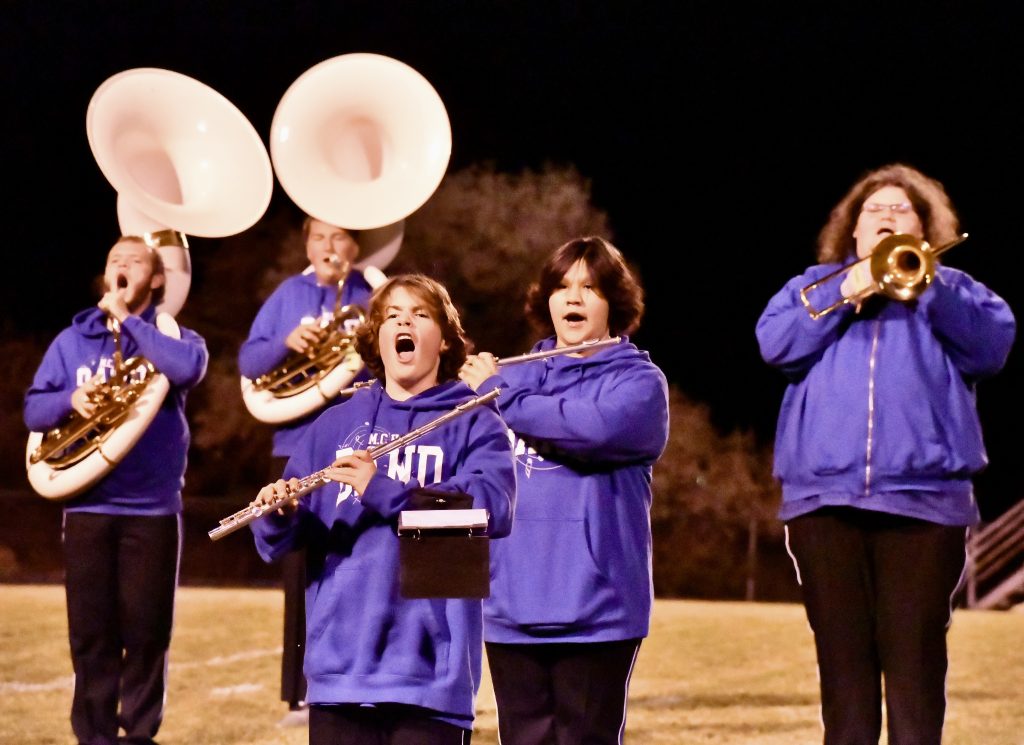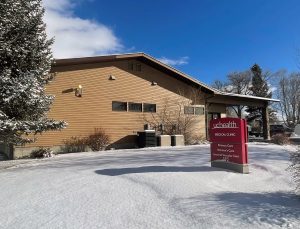MCSD Whiteboard: Music matters at Moffat County schools

Andy Bockelman/Craig Press
At Moffat County School District, the success of every student is priority one.
Success means a lot of different things, and one of the ways Bulldogs succeed and thrive is through music education. We asked MCSD music teachers why music education is so important. Here’s what they said.
Jordan Anderson, Sunset Elementary School music teacher
“Music is an important part of learning and ties into just about every subject, from math to reading to history. To me, one of the best parts of music class is performing; it helps students build confidence and get comfortable in front of an audience. Most of all, music is fun! My hope is that every student leaves my classroom having found a style of music they love.”
Eliana Mack, Ridgeview Elementary School music teacher
• “How do we explain the importance of music education in schools without tying its value to other subjects? Is music really just a break in a student’s day to give other teachers planning time, or simply a tool to boost academic performance elsewhere? I feel this question doesn’t receive nearly enough attention in the world of education. And when it does, the answer is too often swept aside—justified by how music supports other subjects, rather than being valued for the sake of music itself. Yes, it’s important for music to connect with other subjects, but that shouldn’t be the main reason it’s taught.”
• “Music education isn’t just an important part of whole-child learning — it’s an essential part of being human. Music connects us on a deep emotional level and brings together people who might otherwise have nothing in common. It creates a sense of community, where individuals come together to listen, create, and belong. It’s both universal and personal at the same time — something everyone can share, yet something each person experiences in their own way.”
• “Music helps children learn to understand and express their emotions, building empathy, connection, and self-awareness. It gives voice to feelings that words can’t quite capture and helps us reach beyond ourselves to connect with others through something truly human.
Imagine a world without music. Life would feel empty and disconnected. Music education keeps that spark alive by giving students the chance to create, express, and connect. It teaches them to feel, to work together, and to understand the world in a more human way.”
Juliann Matheson, Moffat County High School and Craig Middle School choir teacher
• “Choral music has a scientifically documented vagus nerve response, which causes our heart rates to slow and improves our feelings of well-being.”
• “Social-emotional learning is an integral part of music education, so students are not just learning music, but also how to be better humans.”
• “Learning to read and write music correlates to better math, science, and literacy scores.”
• “Singing in particular improves breathing, posture and muscle tension. Music is a proven pain reliever by reducing the stress hormone cortisol and boosting the Immunoglobin A antibody, so it also helps kids stay healthier.”
• “People feel more positive after actively singing than they do after passively listening to music or after chatting about positive life events due to the release of chemicals in our brain.”
• “Music brings disparate individuals together to accomplish a common goal.”
• “Humans have been making music for at least 40,000 years — They’ve only been playing sports for about 15-20,000 years — and one could argue music is an innate human characteristic.”
Lia Arnold, Moffat County High School and Craig Middle School band teacher
• “Music education is incredibly valuable because it supports the development of the whole child: cognitively, emotionally, socially, and culturally.”
• “Research has shown that music engages a diverse network of brain regions and circuits, including those responsible for sensory-motor processing, memory, emotion, and higher-level thinking. Listening to and performing music can strengthen these neural connections, while music training itself has been shown to create structural and functional changes in the brain that positively affect social bonding, cognitive abilities, and language processing.”
• “Beyond the cognitive benefits, music is unique in that it encompasses every other subject in school: students use math to understand rhythm, language to read and write about music, science to explore how sound works, history to learn about composers and context, and even physical education as they build the muscles and coordination needed to play an instrument.
• “Music is also one of the few things that every single culture in the world, throughout all of human history, has developed on its own. Humans are inherently musical beings as we use music to communicate, to express ourselves, and to connect with others. It’s also an incredibly powerful tool for collaboration. What else can get a room full of more than thirty children to coordinate their movements precisely, at the exact same time, toward a shared artistic goal without saying a single word?”
• “Music brings people and cultures together, provides a sense of belonging, and gives every student an opportunity to find their voice. It’s an art form, a language, and a community all in one and that’s what makes it so important to teach in schools.”

Support Local Journalism

Support Local Journalism
Readers around Craig and Moffat County make the Craig Press’ work possible. Your financial contribution supports our efforts to deliver quality, locally relevant journalism.
Now more than ever, your support is critical to help us keep our community informed about the evolving coronavirus pandemic and the impact it is having locally. Every contribution, however large or small, will make a difference.
Each donation will be used exclusively for the development and creation of increased news coverage.









